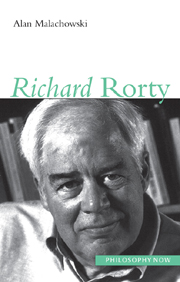3 - Pragmatism
Summary
“Pragmatism” is a vague, ambiguous, and overworked word. Nevertheless, it names the chief glory of our country's intellectual tradition.
(CP: 160)Consolidation?
After Philosophy and the Mirror of Nature, Rorty's next book was an important collection of articles gathered together in 1982 under the title Consequences of Pragmatism (CP). Since it fleshed out more details of “various topics dealt with sketchily” in PMN (CP: x), the publication of this collection can be seen, in large part, as a consolidating venture. The pragmatism that hovers in the background throughout much of Philosophy and the Mirror of Nature is brought out into the open. Moreover, some of Rorty's most significant ‘acts of appropriation’, involving thinkers such as Heidegger, Dewey, Wittgenstein and Derrida, are put into a clearer context by demonstrations as to how Rorty actually reads their work. The deep disenchantment with the notion of ‘philosophical method’ that surfaced in PMN is explained in more depth, along with the correlatively deplored ‘Kantian’ insistence that philosophy is “more than a kind of writing” (CP: 93). And finally, Rorty returns with renewed confidence to the theme of “what a postphilosophical culture might look like” (CP: xxi).
- Type
- Chapter
- Information
- Richard Rorty , pp. 67 - 96Publisher: Acumen PublishingPrint publication year: 2001
- 1
- Cited by



